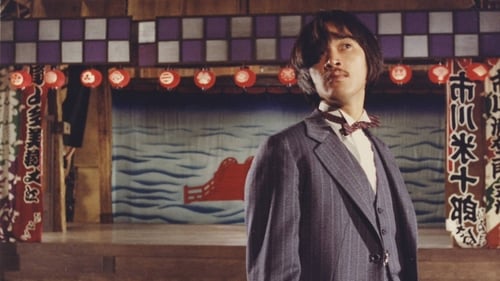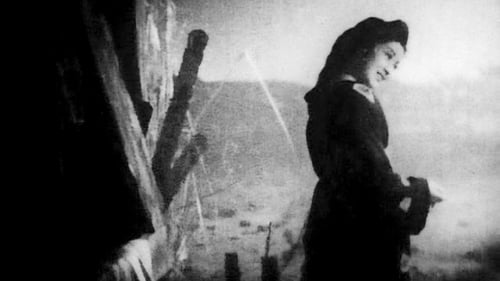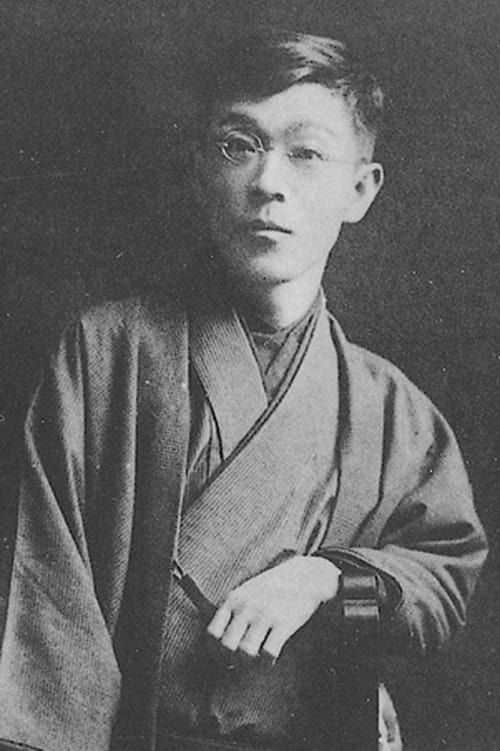Izumi Kyōka
Nascimento : 1873-11-04, Kanazawa, Ishikawa Prefecture, Japan
Morte : 1939-09-07
História
Izumi Kyōka (泉 鏡花 Izumi Kyōka, 4 November 1873 – 7 September 1939), real name Izumi Kyōtarō (泉 鏡太郎 Izumi Kyōtarō), is the pen name of a Japanese author of novels, short stories, and kabuki plays who was active during the prewar period.
Kyōka's writing differed greatly from that of the naturalist writers who dominated the literary scene at the time. Many of Kyōka's works are surrealist critiques of society. He is best known for a characteristic brand of Romanticism preferring tales of the supernatural heavily influenced by works of the earlier Edo period in Japanese arts and letters, which he tempered with his own personal vision of aesthetics and art in the modern age.
-- Wikipedia

Theatre Play
The modern-day story of a man searching for a friend who has mysteriously disappeared, with a magical tale involving strange creatures, a heartbroken princess, and a pact that can't be broken. Conflicts between faith and skepticism, and between social obligation and personal desire drive the narrative toward a dramatic conclusion where the worlds of the real and the surreal inevitabl

Theatre Play
A young samurai dares to approach a castle mistress as he searches for an escaped falcon, a crime punishable by death, but escapes with his life. He is forced to return to the castle by the dying light, but the mistress has become fascinated with him...

Original Story
Melodrama about a woman refusing surgery.

Original Story
Nagare, a painter who wanted to commit a lover’s suicide with Mizue, the wife of his friend and patron Takigawa. Growing afraid at the last moment, he doesn’t go through with it – but Mizue sinks to the bottom of Blue Lake. Some time later, Nagare follows an invitation by Takigawa, who claims to have forgiven everything. To Nagare’s shock, Takigawa’s new wife, Ameko, looks exactly like Mizue. While staying as Takigawa’s guest, Nagare becomes haunted by Mizue’s ghost, who wants to be reunited with him at the bottom of Blue Lake.

Writer
A young priest is on a personal pilgrimage for enlightenment through the snow covered trails of Mt. Koya in Wakayama prefecture, Japan. He is headed towards one of the many sacred gates/temples that are there. Misdirected by a local postman, the priest is sent straying off of the main road and onto the back roads which lead to a small secluded cottage. There he meets a beautiful but bewitching woman whose raw sexuality seems utterly impossible to resist. The woman subjects the priest to numerous carnal temptations in the hopes of breaking his sacred vows of celibacy. Over the next days, the priest's will is put to the test until eventually it breaks. His faith shattered, the priest goes mad when he discovers that the temptress that seduced him was the tortured spirit of a young woman who died horrifically with her lover in the Hiroshima atomic bomb attack.

Novel
Tóquio, 1926. Shunko Matsuzaki é um dramaturgo de teatro shinpa (moderno), e tem como mecenas o poderoso Tamawaki. Um dia, ele se depara com a bela Shinako numa ponte. Ela pede que Matsuzaki a acompanhe até o hospital para fazer uma visita a uma mulher moribunda. Ela deseja sua companhia pois tem medo de encontrar uma senhora vendedora de fisális, fruta que supostamente contém as almas das mulheres. Matsuzaki recusa, mas Shinako retorna em outras aparições, e torna-se sua amante. Em seguida, ela desaparece. Tempos depois, Matsuzaki descobre que Shinako pode ser o fantasma de uma antiga esposa de Tamawaki. Depois de receber uma carta de Shinako, Matsuzaki viaja para Kanazawa a fim de encontrá-la. No trem, ele encontra Tamawaki, que diz que está viajando para presenciar um suicídio por amor. Segundo filme da “trilogia Taisho,” que segue o mesmo estilo alucinatório do primeiro.

Theatre Play
Outside of a small village in Japan, a mysterious pond is inhabited by mythic creatures. Their story is of revenge, tragedy, and the power of real love. A classical tale which translates wonderfully to film.

Book
1º segmento: "L'île aux sirènes" – (A Ilha das Sereias) - Direção de Just Jaeckin – Um sonho de náufrago adolescente e burro. Por falar nisso a burrice é chata e ridícula. Ela engana, é contagiosa e enche o saco, pois lhe falta a autocrítica!
2º segmento: "Kusa-Meikyu" – (O Capim Labirinto) - Direção de Shûji Terayama – Poesia, fantasia, melodia, e tudo mais que você queria. Beleza pura. PARENTE lhe assegura.
3º segmento: "L'armoire" – (O Armário) - Direção de Walerian Borowczik – UMA DAS MAIS INTERESSANTES E EMOCIANANTES HISTÓRIAS DO GÊNERO. Adivinhem quem resolveu sair do armário?

Original Story
Akira is haunted by a "bouncing ball" song that he remembers his mother singing when he was a small child, and now on the verge of a sexually active adulthood, he wants to find the origins of the song. The young man ostensibly wanders into a time-warp in which aspects from his childhood and adulthood mix together. In this never-never land he comes across a beautiful woman/witch who is lost inside the labyrinth of her mansion, just as the young man is lost in the labyrinth of time — and on some levels, perhaps the labyrinth of his subconscious.

Novel
Adaptação de um romance escrito por Kyouka Izumi. Conta a história do amor impossível entre um estudioso e uma gueixa no final do século XIX.

Novel
Late romance by acclaimed filmmaker Kinugasa Teinosuke.

Novel

Original Story
1959 Shintoho adaptation of Kyoka Izumi's novel "A Woman's Pedigree".

Novel
The story follows Oshino, a geisha who is trying to start a new life with a lover who is a painter. However, her past filled with debts and pimps catches up to her.

Original Story
Nominated for Golden Berlin Bear.

Original Story
Ichikawa's 1956 adaptation of Nihonbashi was the first to take the work of Kyoka Izumi— until then regarded as a writer of common tragic melodramas—and re-evaluate it as a tanbi-ha work of decadence, aestheticism, and intrigue. Ichikawa's film presents the tragic plot of the young geisha who is unable to enact her love for a man publicly in any way other than a histrionic story of torment, a heart-rending tale of lovers being crushed by fate. Instead, Ichikawa shows the contest of wills that transpires as two geisha, Oko and Kiyoha fight for the top spot in Nihonbashi, the pinnacle of the Tokyo geisha world. Nihonbashi is an elegant, if steely, exposition of manners. The young doctor, Shinzo Katsuragi, is the object of affection for both women, but appears to be more the choice reward for the plotting and thieving of these two early modern superwomen, than a lover they swoon over.

Novel
Hayase, a schoolteacher, assists Sakai in editing a German-Japanese dictionary. Hayase owes much to Sakai, as Sakai raised him for 13 years after Hayase lost his parents in a war. Hayase has been secretly married to Otsuta, a former geisha, and has been unable to tell Sakai of the marriage, aware as he is that Sakai wants him to marry his daughter, Taeko. Otsuta wants Hayase to tell Sakai about her, but understands the difficulty of his position. At a festival, Otsuta is mistaken for a pickpocket and taken to the police. Because of her background as a geisha, newspaper reporters eagerly delve into her past and report that she has been married to Hayase. Unaware of what has been printed in the papers, Hayase decides to tell Sakai about his marriage. Sakai shows the newspaper to him and orders Hayase to part with Otsuta. Given no chance to explain, Hayase accepts Sakai's order.

Story
A 1946 Japanese film directed by Keigo Kimura.

Original Story
A self-absorbed young actor humiliates an elderly Noh performer, who then commits suicide. His act of cruelty compels his father to disown him, leading the once promising actor to a life on the streets. But his desire to win back the respect of his father and the affection of the dead actor's daughter pushes him toward a more noble existence. Naruse employed a delicately structured mise-en-scene in this family melodrama, which evokes the work of Josef von Sternberg.

Novel
1942 adaptation of Izumi Kyoka's novel.

Novel
OSHINO, the beautiful daughter of restaurant owners, is in love with SHIRASAGI the painter. But there is another young man, the son of a moneylender family, who is desperately in love with Oshino...

Novel
A melodrama by noted auteur and father of director Yoshitaro Nomura, Hotei Nomura. This is apparently the first adaptation of Izumi Kyoka's The Romance of Yushima.

Novel
Taki no Shiraito is a very independent young woman with a famous water juggling act in a travelling carnival troupe. She falls in love with an orphaned carriage driver Kinya Murakoshi, and pledges to put him through law school in Tokyo. She always encloses money in her letters to him, until one hard winter there is no work to be found.






